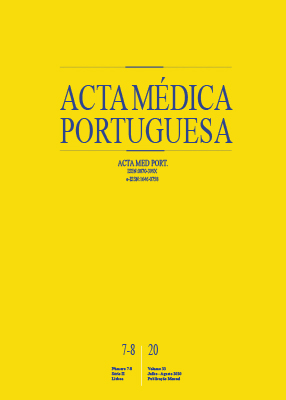Urinary Tract Infections Caused by Community-Acquired Extended-Spectrum β-Lactamase-Producing Enterobacteriaceae in a Level III Hospital - A Retrospective Study
DOI:
https://doi.org/10.20344/amp.12338Keywords:
Anti-Bacterial Agents, beta-Lactamases, Child, Community-Acquired Infections, Enterobacteriaceae, Enterobacteriaceae Infections, Urinary Tract InfectionsAbstract
Introduction: The emergence of β-lactamases producing bacteria is a problem worldwide, with increasing importance in communityacquired infections, especially in urinary tract infections. Data regarding the use of non-carbapenem antimicrobials in these infections are scarce. The aim of this study was to analyse the treatment and outcome of urinary tract infections caused by community-acquired β-lactamase-producing bacteria in children.
Material and Methods: Retrospective study performed in a level III paediatric hospital, between June 2007 and December 2017. All children with β-lactamase-producing Enterobacteriaceae identified in aseptically collected urine culture were included.
Results: A total of 175 urinary infections caused by β-lactamases producing bacteria were diagnosed, 34 (19%) were community-acquired: 25 Escherichia coli (74%), 4 Klebsiella pneumoniae (12%), 4 Proteus mirabilis (12%) and 1 Proteus vulgaris (3%). In 30 (88%) cases, it was the first urinary infection. After identification of the microorganism and antimicrobial susceptibility, 33 (97%) children were re-evaluated and 24 (71%) had a repeat urine culture, which was positive in three (13%). In six (18%) cases, antibiotic treatment was modified. Four (12%) children had another UTI in the following month. In 30 (88%) children, imaging was carried out, with no nephrourological malformations detected.
Discussion: In the last decade, about 20% of urinary infections caused by β-lactamase-producing Enterobacteriaceae were community-acquired with a relatively stable number of cases over the years. No nephro-urological malformations were identified in these children.
Conclusion: Although the number of cases is small, the clinical and microbiological outcomes showed that most were successfully treated with non-carbapenem antibiotics, with low recurrence of new episodes of urinary tract infections.
Downloads
Downloads
Published
How to Cite
Issue
Section
License
All the articles published in the AMP are open access and comply with the requirements of funding agencies or academic institutions. The AMP is governed by the terms of the Creative Commons ‘Attribution – Non-Commercial Use - (CC-BY-NC)’ license, regarding the use by third parties.
It is the author’s responsibility to obtain approval for the reproduction of figures, tables, etc. from other publications.
Upon acceptance of an article for publication, the authors will be asked to complete the ICMJE “Copyright Liability and Copyright Sharing Statement “(http://www.actamedicaportuguesa.com/info/AMP-NormasPublicacao.pdf) and the “Declaration of Potential Conflicts of Interest” (http:// www.icmje.org/conflicts-of-interest). An e-mail will be sent to the corresponding author to acknowledge receipt of the manuscript.
After publication, the authors are authorised to make their articles available in repositories of their institutions of origin, as long as they always mention where they were published and according to the Creative Commons license.









